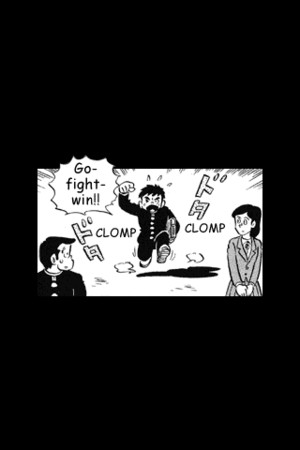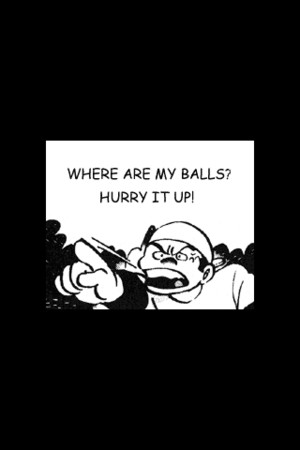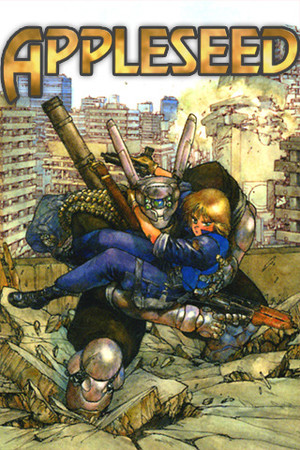Jason Thompson's House of 1000 Manga Special Edition Part 3: Sports Manga and Ginga: Silver Shooting Star
by Jason Thompson,
House of 1000 Manga Special Portable Edition Part 3: Sports Manga and Ginga: Silver Shooting Star
I'm on the last week of my trip to Jordan, which has hijacked this column into a semi-autobiographical travel story. And at last, after many long journeys, I've discovered a place in Amman that sells manga: the amazing Books@Cafe in a small backstreet from the tourist district on Al-Rainbow road. Their manga selection is pretty small, just a couple of books mixed with American comics and anthologies of writings by Palestinian lesbians, but I'd definitely recommend this place to anyone who is traveling in the country, manga fan or not. Where else in Jordan can you smoke a hookah, drink a latte, and buy a Hideshi Hino graphic novel all in the same place?

But mostly, I've been reading manga on my iPhone, because wherever I can find the internet, I can find translations of 30-year-old sports manga. Eleven, written by Taro Nami and drawn by Hiroshi Takahashi, is a kids’ soccer manga. The hero, Shigeru, is an enthusiastic little kid just entering high school; before leaving the house on his first day, he prays at the household shrine to his dead dad (“I'm gonna do my best, so keep watching over me!”), then goes to school cheered by his tomboyish working mom, who shouts “Go! Fight! Win!” as she sees him off. At first, Shigeru's classmates just think he's a skirt-flipping dork, but soon they realize that he's the champion of his junior high track team, who wears oversize shoes with lead weights to improve his leg strength (“Guys who do better than most people also put in effort people never see.”) The track team tries to recruit him as a member, only for Shigeru to reveal his second secret. “I was only using track to improve my soccer skills! I wanted to have legs stronger than any high schooler!” Turns out Shigeru's dead father was a famous soccer player, and Shigeru has always wanted to follow in his footsteps, so he's been training night and day since he was little.
The subtitle for the first chapter, “Chapter 1: Just Gotta Play Soccer!”, pretty much sums up Eleven. As fits the main character's personality, it's a manga of pure yujo, doryoku, shori (friendship, perseverance, victory), with a plucky, openhearted hero with superhuman abilities and not much use for introspection. The author might be winking at the reader when Shigeru explains his dad's secret notebook of soccer training exercises (“Maybe because he was a little bit drunk when he wrote it, it was an incredibly hard soccer program, way tougher than anything I'd ever dreamed of.”) It's a sports manga formula that works for a reason, but the art doesn't have a lot of character, and the hero's simplicity makes him a little boring; it's not too rewarding getting in the mind of a soccer robot. (He does have a bit of a romantic interest, though.) With its dumb jokes and simple dialogue, it's definitely a story intended for younger readers. Another odd problem is that the panels are a little small, not filling all the space on the iPhone; I don't know if this was because it was formatted for another phone and not properly reformatted, or if it was intentional, but it's annoying to have an already tiny image space made even smaller.
Akio Chiba's Captain: Taniguchi Chronicles is another sports manga, this one even older-looking, like something drawn in the 1960s. Set in a factory town, it's the story of Taniguchi, a shaved-headed, nervous, tiny little eighth-grader. Like Shigeru in Eleven, he's also just entered a new school, and wants to play sports, but their problems couldn't be more different. When the other kids find out that Taniguchi used to go to Aoba Gakuin, a school with a famous baseball team, they all assume that he has awesome baseball skills. In fact, Taniguchi was really only a bench warmer, but no matter how he tries to tell them they're wrong, his classmates assume he's great and build up incredible expectations. (“So is he really that good?” “Of course! The way he hits, he could be in the pros. I'm sure of it!” “The spring regional tournament is going to be fun! We have Taniguchi on our team! Ha ha ha!”) Taniguchi gets so nervous about disappointing his new teammates that he goes home and cries to his dead, a red-nosed, blue-collar type in a fundoshi. He wants to transfer to a new school, but his dad offers to help improve his baseball skills instead. They go out and throw around balls in the park for hours, and then his dad makes an automatic batting machine for him so he can take even faster balls. He practices until his uniform is dirty and torn. His mom thinks his dad is overdoing it, but dad snaps at her: “Whether our son becom es a man or not is hanging in the balance!”
es a man or not is hanging in the balance!”
Akio Chiba was the brother of the better-known mangaka Tetsuya Chiba, the writer of many famous sports manga, including Ashita no Joe. According to Wikipedia, Akio had problems with depression and eventually committed suicide, and the interesting thing about Captain is that it kind of shows it; I've never read a sports manga whose hero was so full of neuroses, self-doubt and fear of social situations. At times his new teammates are his friends, but at other times they're an intimidating group of strangers who seem like they may at any moment ostracize our hero. Taniguchi plays baseball like Charlie Brown from Peanuts, and he's just as bald, too. Of course, it's a heartwarming story deep down, but the hero's vulnerabilities make him sympathetic and give the story a bit of emotional depth. It's a nice taste of a major sports manga series which ran for 26 volumes in Japan. On the downside, the old-fashioned art looks more like a gag manga than a modern shonen action story, and like Eleven, the panels are very small on the iPhone screen. Also, there are too many vibration effects, a ‘special feature’ of the cellphone manga from the NTT Solmare company; whenever a bat hits a ball or someone shouts really loud, the phone shakes and makes a little noise. Captain overdoes this effect, which doesn't add anything to the reading experience and drains your phone's battery faster.
The best cellphone manga I read this week is Ginga: Silver Shooting Star by Yoshihiro Takahashi. I previously reviewed the sequel to this manga, Ginga Legend Weed, which is also available in English only in a weird digital format, but I liked Ginga: Silver Shooting Star a lot more. Maybe it's just my anthropocentrism speaking; whereas Weed is a story about talking dogs from the very beginning, the original Ginga starts out as the story of the human characters. Gohei the bear hunter is a grouchy old alcoholic man-mountain who has been hunting the crazed killer bear, Akakabuto, in the wilderness for five years. His only companion is Riki, an Akita bear dog who faithfully stands with Gohei despite difficult circumstances and a horrible translation (“Mission of a bear dog to sacrifice own life for his master will not change at any extreme situation!”). The other main human character is Daisuke, a hyper little kid who hangs out back at the local ski lodge and happens to be present when Riki's mate, Fuji, gives birth to a litter of pups. One of them is a beautiful dog with silver fur. “It's silver color!? So…I'll name you “GIN”…this must be cool!” Daisuke declares. Or, as the narrator puts it, “With the fate of short life as a bear dog, it was an ephemeral and excellent dog with tiger stripes!!”

Soon enough, Gohei and Riki are fighting for their lives in a blizzard against the monstrous Akakabuto, who, in a scene out of an ‘80s slasher movie, surprises a teenage couple making out in the woods and dismembers them. It's man and dog vs. bear in a grueling battle in the wilderness! In one particularly intense scene, a dying Gohei asks Riki to eat him so he, at least, won't starve. Riki refuses! Gohei grabs a hunk of rotten meat (which apparently even a dog wouldn't eat) off the ground and tries to force it down Riki's throat! Meanwhile, back at home, the young pup Ginga grows up and prepares to follow his father's path in pursuit of the evil bear.
This is a fast-paced, high-energy story, and it's a lot of fun, despite the wretched translation. Yoshihiro Takahashi's art, with its bushy-browed heroes, big expressions, constant action and constant speedlines, is very oldschool shonen manga, reminding me a bit of Go Nagai. The whole thing just feels more exciting and natural than the stiffer and more pompous Ginga Legend Weed, and it jumps right into the action. Unfortunately, the image resolution is terribly low-quality, worse than the other NTT Solmare cellphone manga; the first chapter looks all right, but the quality collapses in the second chapter. Also, although I don't have the original to compare it to, a confusingly drawn decapitation in one scene suggests that this manga is censored for violence. It's too bad, because if not for these things (and the awful translation), this would definitely be worth reading.

Masamune Shirow's Appleseed, the post-apocalyptic science fiction manga about a pair of mercenaries in a genetically engineered planned community in the future, is also available on cellphones. It's a classic manga which has more sympathetic characters than the hyperintelligent cyborg government agents of his better known Ghost in the Shell. The Dark Horse edition of this classic manga probably deserves a full column in the future; as for the NTT Solmare cellphone edition, it has a good translation. But the most satisfying NTT Solmare manga, which I've reviewed elsewhere, is The Poor Man's Dining Table by Maki Otsubo. This goofy, low-down little comedy is an anthology cooking manga about an incredibly poor single father whose loves in life are gambling, being unemployed and cooking delicious meals for his kids with minimal money. Each meal can be made for only a couple of hundred yen. Some of the meals are not exactly appetizing (pork and lettuce cooked with mayonnaise in a microwave, etc.), but it's pretty edu-taining, and you get three short chapters for your $2.99, making it one of the best deals among iPhone manga.
After reading a bunch of cellphone manga, I have to conclude: the standard cellphone manga format has serious problems. The high price, the annoying way the manga is broken up panel by panel, the clunky user interface and especially the censorship makes it hard to justify buying manga in this format. Four years ago, it may have been exciting just to see manga on your phone, but nowadays, with touchscreens and higher-resolution phones being common, most cellphone manga are as obsolete as left-to-right graphic novels for 17 bucks. NTT Solmare's English cellphone manga follows this format, as does Guilstein and Tokyopop's early cellphone versions of things like Dramacon. One of the better cellphone manga I've read, on the other hand, is Tokyopop's edition of Hetalia. Using Comixology's comics viewer (full disclosure: I occasionally write reviews for Comixology's website), it shows a preview of each full page as you come to a new page (you can turn this preview off), then lets you move from panel to panel with the ‘camera’ moving around on the page when you tap the screen. You can choose how fast the camera moves between panels, from super fast to super slow. You also get a full-page preview mode when you flip from page to page, instead of having to flip around blindly trying to remember whether that cool scene was on panel 121 or 122 of 208. The only suggestion for improvement I can offer is that it would be good to be able to totally disable the panel-by-panel view and go entirely page-by-page if the reader wants to.
Comixology, like Viz and Yen Press's iPad apps, offers a better comics-reading experience, but the one thing that bad cellphone manga does offer is the experience of finding obscure stuff—like Salaryman Kintaro, sports and cooking manga—which you'd never find anywhere else. I like reading manga on digital devices, but I have to admit, I'd much rather read new stuff that's never been translated than read old scans of Death Note and Maximum Ride. My advice to digital publishers: it's not enough to just scan your backlog, go forth and find new weird stuff and translate it! As for me, I'll be back in the US next week and writing about manga on paper again.
Jason Thompson is the author of Manga: The Complete Guide and King of RPGs, as well as manga editor for Otaku USA magazine.
Banner designed by Lanny Liu.
discuss this in the forum (7 posts) |
this article has been modified since it was originally posted; see change history